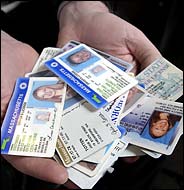Nevada Set to Restrict Employer Use of Credit Checks
Friday, June 7th, 2013 Perhaps as a result of fallout after the Great Recession, Nevada’s governor signed a new law limiting employers’ use of credit checks when making hiring and personnel decisions. The law, which takes effect October 1 2013, prohibits employers to ask any employee or prospective employee to submit a consumer credit report or other credit information as a condition of employment.
Perhaps as a result of fallout after the Great Recession, Nevada’s governor signed a new law limiting employers’ use of credit checks when making hiring and personnel decisions. The law, which takes effect October 1 2013, prohibits employers to ask any employee or prospective employee to submit a consumer credit report or other credit information as a condition of employment.
Further, employers may not use, refer to or inquire about a consumer credit report of discipline or discriminate against an employee or deny employment or a promotion on the basis of a credit report. Employees who refuse or fail to submit consumer credit reports and those who have file complaints in the past cannot be discharged or disciplined, either.
That’s a very broad prohibition of credit checks, denying employers the right to know whether a prospective employee has a history that could negatively affect the employer’s business.
However, Nevada allows certain exceptions, including:
- The employer is required or authorized under state or federal law to use a credit report for an accepted purpose.
- The employer reasonably believes the employee or prospective employee has engaged in a specific activity that may violate a state or federal law.
- The information contained in the employee’s or prospective employee’s credit report is reasonably related to the position for which he or she is applying or being evaluated for.
“Reasonably related” refers to several categories. Employers may conduct credit checks for employees or prospective employees who:
- Would be handling or responsibility for money, credit and debit cards and financial accounts.
- Would have access to trade secrets, proprietary information or confidential information.
- Are being considered for managerial or supervisory responsibilities.
- Have access to financial information belonging to others.
- Would be handling or responsible for personal information of others.
- Would be directly exercising law enforcement authority.
- Are being considered for employment with a financial institution or a licensed gaming establishment.
The new law contains remedies of up to $9,000 for each violation, along with lost wages, reinstatement, promotion or employment, depending on plaintiffs’ claims.
Joining California, Washington, Oregon, Illinois, Connecticut, Colorado, Vermont and Hawaii, Nevada is making it more difficult for employers to use credit checks in personnel decisions, unless the person falls under one of the above categories.









